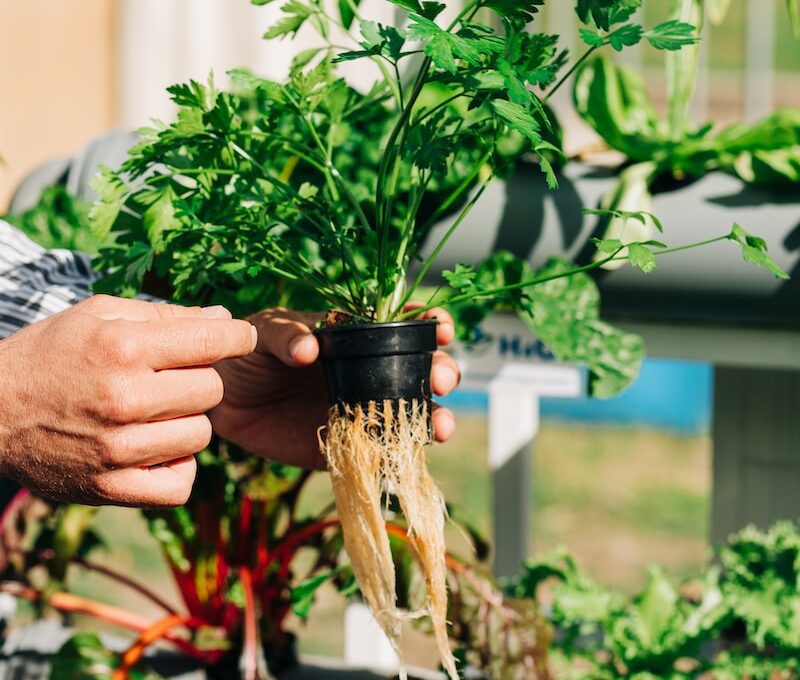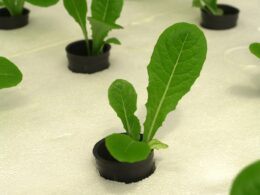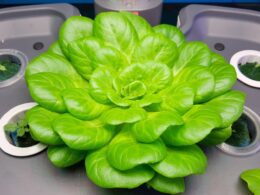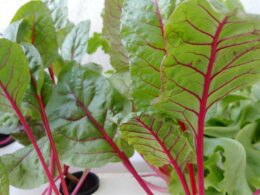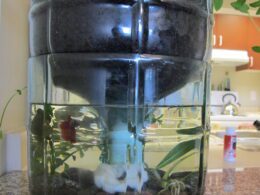Are you considering starting a hydroponic garden but worried about the maintenance involved? Hydroponics is a method of growing plants without soil, using nutrient-rich water instead.
While it may seem like a high-maintenance option, the truth is that with the right knowledge and tools, hydroponics can actually be a low-maintenance and efficient way to grow plants.
In this article, we’ll take a closer look at the basics of hydroponics and the factors that can impact maintenance. We’ll also provide tips and resources to help you optimize your hydroponic system and determine if it’s the right choice for you.
So whether you’re a seasoned gardener or just starting out, read on to discover the truth about hydroponic maintenance.
Understanding the Basics of Hydroponics
Get ready to learn the basics of growing plants without soil and discover how easy it can be! Hydroponics is a method of gardening that doesn’t use soil. Instead, it relies on a nutrient-rich water solution to feed the plants.
This method has been gaining popularity in recent years due to its many benefits. One of the benefits of hydroponic gardening is that it allows you to grow plants in a controlled environment. With hydroponics, you can adjust the nutrient solution, pH levels, and temperature to meet the specific needs of your plants. This results in healthier and more productive plants.
Another advantage of hydroponics is that it requires less space than traditional soil gardening. Since plants grown in hydroponic systems don’t need soil, you can grow more plants in a smaller area. While hydroponics may seem high maintenance, it actually requires less time and effort than traditional soil gardening.
With hydroponics, you don’t need to worry about weeding, tilling, or amending the soil. Additionally, since the nutrient solution is constantly circulating, you don’t need to water your plants as often. Overall, hydroponics is a low-maintenance way to grow healthy and productive plants.
Factors that Impact Hydroponic Maintenance
Keeping a hydroponic system running smoothly requires attention to various factors that can impact its maintenance needs. One of the most important aspects of hydroponic maintenance is nutrient management. In a hydroponic system, plants receive their nutrients from a nutrient solution that is circulated through the system. You need to make sure that the nutrient solution is properly balanced so that your plants receive the right amount of nutrients. This involves regular testing of the nutrient solution and adjusting it as needed.
Pest control is another important factor that can impact hydroponic maintenance. Because hydroponic systems are soilless, pests can be a major problem. You need to monitor your plants regularly for signs of pests and take measures to control them if they are present. This may involve using organic pest control methods such as introducing beneficial insects or using neem oil, or it may involve using chemical pesticides. Whatever method you choose, it’s important to stay vigilant and take action at the first sign of a pest infestation.
In addition to nutrient management and pest control, there are other factors that can impact hydroponic maintenance. These include pH management, water quality, and equipment maintenance. pH management involves monitoring and adjusting the pH of the nutrient solution to ensure that it stays within the optimal range for plant growth. Water quality is also important, as impurities in the water can affect the health of your plants. Finally, equipment maintenance involves regularly cleaning and maintaining your hydroponic system to prevent clogs, leaks, and other issues that can impact its performance.
By staying on top of these factors, you can keep your hydroponic system running smoothly and produce healthy, vibrant plants.
Tips for Optimizing Hydroponic Efficiency
To maximize the efficiency of your hydroponic system, it’s helpful to implement strategies that optimize nutrient balance, pest prevention, pH levels, water purity, and equipment maintenance.
Nutrient management is key to keeping your plants healthy and productive. Be sure to monitor the levels of nutrients in your solution regularly and adjust as necessary. Keep in mind that different plants have different nutrient requirements, so be sure to research what your specific plants need.
Water conservation is another important aspect of hydroponic maintenance. Recycling and filtering your water can help reduce waste and save you money on water bills. It’s also important to keep your water clean and free of contaminants, such as algae and bacteria. Regularly cleaning your reservoir and equipment can help prevent these issues from arising.
In addition to nutrient management and water conservation, equipment maintenance is crucial to the success of your hydroponic system. Regularly check your pumps, timers, and other equipment for any signs of wear and tear. Replace any damaged or worn parts as soon as possible to avoid any disruptions in your system.
By implementing these strategies, you can optimize the efficiency of your hydroponic system and enjoy a bountiful harvest.
How Often Do Hydroponics Systems Need to Be Cleaned?
Hydroponics systems require regular cleaning to maintain optimal functionality and prevent the buildup of algae, bacteria, and mineral deposits. Experts recommend performing a thorough hydroponics cleaning necessary every 1 to 3 months, depending on the system size, complexity, and nutrient solution used. Cleaning involves flushing the system, disinfecting components, and removing any debris or residues that may hinder plant growth. Keeping hydroponics systems clean is crucial for ensuring healthy plants and maximizing crop yields.
Tools and Resources for Hydroponic Maintenance
When it comes to maintaining your hydroponic system, having the right tools and supplies is essential. Luckily, there are many online resources available to help you find what you need.
From online communities and support groups to professional services and consulting, you can find the help you need to keep your hydroponic setup running smoothly. So don’t be afraid to reach out and utilize these resources for a successful hydroponic garden.
Equipment and Supplies
You’ll need to have certain equipment and supplies on hand to ensure that your hydroponic plants are getting everything they need to thrive. The most important piece of equipment is a hydroponic system, which can range from a simple DIY setup to a more complex kit.
You’ll also need grow lights, which provide the necessary light for photosynthesis, and a timer to control the light cycle. Additionally, you’ll need nutrient solutions, which provide the necessary minerals and vitamins for plant growth, and a pH meter to maintain a proper pH balance. With these supplies on hand, you’ll be able to easily maintain your hydroponic system and ensure that your plants are growing healthy and strong.
Other supplies that can be helpful include a water pump to circulate the nutrient solution, a thermometer to monitor the temperature, and a fan for air circulation. You may also want to invest in a water filtration system to ensure that your plants are getting clean, purified water.
While it may seem like a lot of equipment and supplies to keep track of, hydroponic maintenance can actually be quite simple and straightforward. With a little bit of effort and attention, you’ll be able to create a thriving hydroponic garden that produces healthy, vibrant plants.
Online Communities and Support
Joining online communities and getting support can be a great way to enhance your hydroponic gardening experience. These communities are filled with people who are passionate about hydroponics and are willing to provide you with help and guidance.
When you encounter problems with your hydroponic system, you can easily ask for advice and receive tips on hydroponic troubleshooting. You can also learn about new and innovative DIY hydroponic solutions that can save you money and improve your yields.
Being a part of an online community can also provide you with a sense of belonging. You can share your successes and failures with others who understand the challenges of hydroponic gardening. You can also learn from other people’s experiences and avoid making the same mistakes.
Joining online communities can be a great way to stay motivated and engaged in your hydroponic gardening journey.
Professional Services and Consulting
The utilization of professional services and consulting can elevate your hydroponic gardening experience to a more refined level. By consulting with professionals, you can ensure that your hydroponic system design is optimized for your specific growing needs. They can also provide guidance on nutrient management, ensuring that your plants receive the appropriate nutrients in the right amounts.
Professional services and consulting can save you time, money, and frustration by helping you avoid common mistakes and maximizing the efficiency of your hydroponic setup. They can also provide ongoing support and troubleshooting, ensuring that your hydroponic garden is always thriving. By investing in these services, you can take the guesswork out of hydroponic gardening and enjoy a more successful, low-maintenance experience.
Conclusion: Is Hydroponics Right for You?
Deciding whether or not to try out hydroponics requires careful consideration of your time commitment and willingness to put in effort. While it may seem like a high maintenance method, it all boils down to your dedication to the process. If you have a busy schedule and cannot commit to daily check-ins, then hydroponics may not be for you. However, if you have the time and passion for growing plants, then hydroponics can be a fulfilling and rewarding experience.
Before jumping into hydroponics, it’s important to weigh the pros and cons and conduct a cost analysis. While hydroponics can be more expensive upfront, it can save money in the long run by reducing the need for pesticides and fertilizers. You also have the potential to yield more crops in a smaller space. On the other hand, hydroponics requires a constant water and nutrient supply, which can add to the maintenance and cost.
It’s important to do your research and determine if hydroponics aligns with your budget and goals. Ultimately, the decision to try hydroponics is up to you. It can be a fun and exciting way to grow plants, but it also requires dedication and maintenance. If you’re willing to put in the effort, hydroponics can be a great way to improve your gardening skills and yield fresh produce. Remember to weigh the pros and cons, conduct a cost analysis, and make an informed decision based on your lifestyle and goals.
Frequently Asked Questions
What types of plants are best suited for hydroponic systems?
When it comes to hydroponic systems, certain plants thrive better than others. Herbs, such as basil, parsley, and mint, are great options as they have shallow roots and grow quickly.
Vegetables like lettuce, spinach, and tomatoes also do well in hydroponic environments.
To maximize yield, make sure to provide the right nutrients and lighting for your plants. Consider investing in a pH meter to ensure the proper balance of acidity in your water.
While hydroponic systems may require more attention than traditional soil gardening, they can be low maintenance with the right setup. With a little effort, you can enjoy a productive hydroponic garden full of fresh herbs and vegetables.
Can hydroponic systems be set up outdoors?
If you’re considering setting up an outdoor hydroponic system, there are many benefits to be had. You’ll be able to take advantage of natural light and fresh air, which can help your plants grow strong and healthy. Additionally, an outdoor setup can be easier to maintain than an indoor one, as you won’t have to worry about controlling the temperature and humidity as closely.
However, it’s important to keep in mind the weather considerations. Extreme heat or cold, heavy rain, or strong winds can all impact your system and your plants. With proper planning and precautions, though, an outdoor hydroponic setup can be a great way to grow your own produce.
How do you prevent algae growth in a hydroponic system?
Preventing algae growth in your hydroponic system is essential for maintaining optimal plant growth and preventing system maintenance issues. To avoid algae buildup, start by keeping your system clean and well-maintained. Regularly clean your reservoir and change out nutrient solutions to prevent excess nutrients from accumulating and promoting algae growth.
Additionally, consider incorporating algae inhibitors or UV sterilizers to further prevent algae growth. With proper maintenance and prevention measures, keeping your hydroponic system free of algae can be easy and low maintenance.
What is the average lifespan of hydroponic equipment?
Hydroponic equipment can have varying lifespans depending on the quality of the equipment and how well it’s maintained. Typically, high-quality hydroponic equipment can last up to five years or more with proper maintenance.
Maintenance requirements include regular cleaning and inspection of equipment, replacing worn out parts, and monitoring nutrient levels. While hydroponic equipment does require some maintenance, it’s not necessarily high maintenance.
With proper care and attention, you can ensure that your hydroponic system continues to function optimally for years to come.
How do you troubleshoot common issues in a hydroponic system?
Maintaining the pH balance and ensuring proper nutrient levels are essential aspects of hydroponic gardening.
To troubleshoot common issues, start by testing the pH level of the water and adjusting it as necessary.
Nutrient deficiency can also be a problem, so make sure to monitor the solution and adjust the nutrients accordingly.
Additionally, check for any clogs or blockages in the system, and ensure that the water level is adequate.
By regularly checking and maintaining your hydroponic system’s pH balance and nutrient levels, you can avoid common issues and ensure a healthy, thriving garden.
Conclusion
So, is hydroponics high maintenance? Well, it depends on your perspective.
While hydroponic systems require a bit of initial setup and ongoing maintenance, they can ultimately save you time and resources in the long run. By optimizing your system and using the right tools and resources, you can minimize the amount of time and effort required to maintain your hydroponic garden.
If you’re willing to put in a little bit of effort upfront, hydroponics can be a rewarding and efficient way to grow plants. By understanding the basics of hydroponics, identifying the factors that impact maintenance, and following our tips for optimizing efficiency, you can create a low-maintenance hydroponic system that yields impressive results.
So, if you’re up for the challenge, give hydroponics a try and see what you can achieve!





